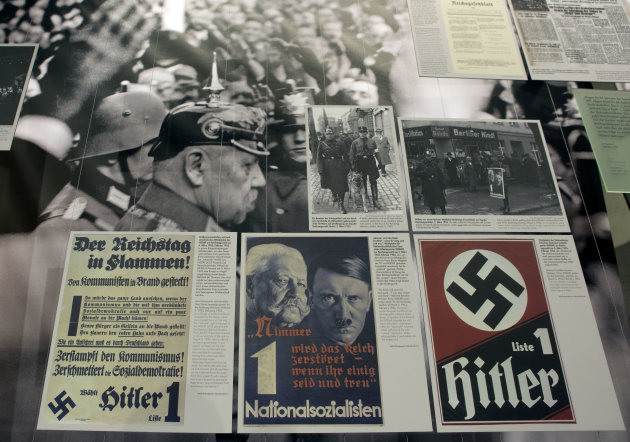OpEd: Jack
Deja vu...the Obama administration certainly appears to be taking this same path of political destruction..congress needs to act and Impeach Obama before it is to late!
~~~~~~~~~~~~~~~~~~~~~~~~~~~~~~~~~~~~~~~~~~~~~~~~~~~~~~~~~~~~~~~~~~
By

Deja vu...the Obama administration certainly appears to be taking this same path of political destruction..congress needs to act and Impeach Obama before it is to late!
~~~~~~~~~~~~~~~~~~~~~~~~~~~~~~~~~~~~~~~~~~~~~~~~~~~~~~~~~~~~~~~~~~
By

BERLIN (AP) — On the 80th anniversary of Adolf Hitler's rise to power, Chancellor Angela Merkel urged Germans to always fight for their principles and not fall into the complacency that enabled the Nazi dictator to seize control.
Speaking Wednesday at the opening of a new exhibit at the Topography of Terror
memorial documenting Hitler's election, Merkel noted that German
academics and students at the time happily joined the Nazis only a few
months later in burning books deemed subversive.
"The rise of the Nazis was made
possible because the elite of German society worked with them, but also,
above all else, because most in Germany at least tolerated this rise," Merkel said.
After winning about a third of
the vote in Germany's 1932 election, Hitler convinced ailing President
Paul von Hindenburg to appoint him chancellor on Jan. 30, 1933 — setting
Germany on a course to war and genocide.
"This path ended in Auschwitz," said Andreas Nachama, the director of the Topography of Terror.
The Topography memorial is built
around the ruins of buildings where the Gestapo secret police, the SS
and the Reich Security Main Office ran Hitler's police state from 1933
to 1945. A stretch of the Berlin Wall along the edge serves as a
reminder of Germany's second dictatorship under the Communists in the
20th century.
Once chancellor, Hitler was able to use his position to consolidate absolute control over the country in the months to follow.
About a month after being
appointed chancellor, Hitler used the torching of the Reichstag
parliament building — blamed on a Dutch communist — to strengthen his
grip on power. He suspended civil liberties and cracked down on
opposition parties, paving the way for the police state.
By midsummer 1933, he had
declared the Nazi Party to be the only political party in Germany. He
later named himself "Fuehrer" or "Leader" of the country.
The fact that Hitler was able to
destroy German democracy in only six months serves as a warning today of
what can happen if the public is apathetic, Merkel said.
"Human rights do not assert
themselves on their own; freedom does not emerge on its own; and
democracy does not succeed on its own," Merkel said. "No, a dynamic
society ... needs people who have regard and respect for one another,
who take responsibility for themselves and others, where people take
courageous and open decisions and who are prepared to accept criticism
and opposition."
Following the morning ceremony,
Germany's Parliament held a special session in tribute to those who died
under the Nazi dictatorship.
Inge Deutschkron, a 90-year-old Jewish Berliner and writer, recalled Germans celebrating Hitler's rise to power as she addressed lawmakers.
She remembered her family growing
more tense over the subsequent weeks amid worries about Hitler's
paramilitary SA thugs who roamed the streets.
"Often, I couldn't get to sleep
in the evenings and listened for footsteps in the staircase," she said.
"If they were boots, I became afraid they could be SA men coming to
arrest my father."
Deutschkron's father managed to
escape to England shortly before World War II, while she and her mother
were hidden by friends in Berlin for the final years of the war.
She recalled most ordinary Germans' indifference to the fate of Jews, who were forced to wear yellow stars.
"The majority of Germans I met in
the streets looked away when they saw this star on me — or looked
straight through me," she said.
And when she visited West Germany's
capital of Bonn after the war, she recalled that most "had simply
erased from their memory the crimes for which the German state had set
up its own machinery of murder."
Deutschkron remembered West
Germany's first postwar chancellor, Konrad Adenauer, saying that most
Germans opposed the Nazis' crimes against Jews and that many had helped
Jews to escape.
"If only that had been the truth," she said.
___
Geir Moulson contributed to this story.
No comments:
Post a Comment